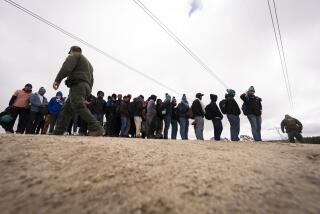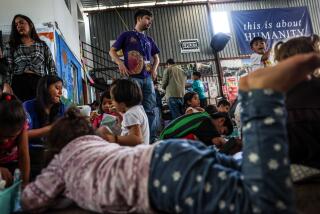Immigration courts are deeply split on who can claim asylum over violence in home countries

Reporting from Washington — Central Americans who travel north to plead for entry at the U.S. border are taking their chances on an immigration system that is deeply divided on whether they can qualify for asylum if they are fleeing domestic violence or street crime, rather than persecution from the government.
The law in this area remains unclear, and the outcome of an asylum claim depends to a remarkable degree on the immigration judge who decides it.
And sitting atop the immigration court system is Atty Gen. Jeff Sessions, a long-time advocate of much stricter limits on immigration who recently has taken an interest in reviewing asylum cases.
Lawyers say they are troubled by a legal system in which decisions turns so much on the views of individual judges.
Among the 34 immigration judges in Los Angeles, two judges granted fewer than 3% of the hundreds of asylum claims that came before them in the past five years, while another judge granted 71% of them. The disparity is even greater in San Francisco, where the judge’s rate of granting asylum claims ranged from 3% to 91%.
Overall, asylum seekers would do much better in San Francisco, where 32% were denied between 2012 and 2017, compared to a 68% denial rate in Los Angeles during the same period, according to TRAC data from Syracuse University.
This is not news to immigration lawyers. A decade ago, several law professors published a study called “Refugee Roulette” that revealed how asylum cases depend heavily on the views of individual judges. “The level of variation was shocking. And it hasn’t changed,” said Georgetown University Professor Philip Schrag.
Judge Ashley Tabaddor from Los Angeles, president of the National Assn. of Immigration Judges, discounts the statistics. “They’re not reliable,” she said, since judges may have very different case loads. Some judges hear claims from people who have been detained for crimes, while others heard mostly claims from juveniles, she said.
“We are human. Different people can have different views about the same set of facts,” she said.
Several Los Angeles lawyers who have won or lost asylum cases in recent months said the identity of the judges played an important role. “It’s astounding how much variation there is from judge to judge. The system is in need of repair. It’s an embarrassment,” said Joseph D. Lee, a partner at Munger, Tolles & Olson.
He represented an El Salvador mother who fled north with her three children after gang members shot and killed her husband’s brother in front of her family and then threatened to do the same to her family.
“The Central American cases can be difficult to win. Some judges are pretty hostile to gang-related claims,” he said. His client’s claim was denied, and he plans to appeal. “Your chance of winning an asylum claim shouldn’t turn on the luck of the draw on which judge you get. But that is exactly how it works,” he said.
It may soon become much harder to win such claims. Under an unusual feature of the law, the attorney general, who is the nation’s top law enforcement officer, also oversees the immigration courts. He can overrule their decisions and announce new rules that are binding on them.
In March, Sessions announced he would review the question of whether women fleeing domestic violence or other “private criminal activity” can rely on this to win asylum.
Last fall, Sessions spoke to a meeting of immigration judges and complained America’s “generous asylum” system has become “overloaded with fake claims. … The credible fear process was intended to be a lifeline for persons facing serious persecution. But it has become an easy ticket to illegal entry into the United States,” he said.
In the past week, the American Bar Assn., faith-based groups and a coalition of immigration law professors submitted “friend of the court” briefs to Sessions urging him not to reverse years of precedent involving women fleeing abuse and terror.
But veteran immigration judges are not optimistic. “[Sessions] just wants more people to be removed,” said Paul W. Schmidt, a retired immigration judge from Virginia and an outspoken critic of the attorney general. “He will make it a lot harder for Central Americans to get asylum.”
The dispute begins with the words of the asylum law. In the Refugee Act of 1980, Congress adopted the United Nations standard and said people may seek asylum if they are “unable or unwilling to return” to their home country “because of persecution or a well-founded fear of persecution on account of race, religion, nationality, membership in a particular social group, or political opinion.”
Under the law, asylum seekers are treated differently than, for example, refugees from a war-torn nation or immigrants seeking work.
Four of those terms in the asylum law are clear enough: race, religion, nationality and political opinion. But lawyers and judges have struggled to decide what counts as “membership in a particular social group.”
Courts have agreed that gays and lesbians can count as a social group, since they have suffered persecution in many societies. Some judges have also said women and girls fleeing sexual abuse and violence can seek asylum because their society views women as the property of men — and with no hope for protection from their government.
But the question becomes harder when considering the gang violence that has spread through some Central American countries. For example, people who testified against violent gangs or resisted them in other ways have sought asylum on the grounds they are members of particularly endangered social group.
“These cases are challenging,” said Nareeneh Sohbatian, a Los Angeles lawyer at Winston & Strawn who supervises asylum claims. “We talk a lot about this. If they are targeted because of a gang, it can be difficult to show it was caused by their membership in a particular social group.”
Jenna Gilbert, managing attorney for Human Rights First in Los Angeles, said it is clear the asylum law does not protect people fleeing “generalized violence.” A claim “needs to be tied to the one of the protected categories,” she said. “The cases are very fact-dependent.”
But the odds of winning asylum are not good for Central Americans. In the past five years, China had the largest number of asylum seekers in the U.S. immigration courts, and only 20% of their claims were denied. Ethiopians did even better, with only 17% denied. By contrast, the highest denial rates arose from claims brought by natives of Jamaica (91%), the Philippines (90%), Mexico (88%), El Salvador (79%), Honduras (78%) and Guatemala (75%).
Andrew Arthur, a former immigration judge who works now at the Center for Immigration Studies, which favors stricter enforcement, said it is not surprising that Sessions will reconsider rulings on asylum in cases of domestic violence. “Right now, the law is very unclear. The phrase ‘particular social group’ is vague. A lot of these claims are compelling, but that doesn’t mean it is ‘persecution’ under the law. If a gang wants to recruit me, that’s not persecution.”
Last month Sessions criticized a caravan of Central American asylum seekers that approached the border as a “deliberate attempt to undermine our laws and overwhelm our system. There is no right to demand entry without justification. Smugglers and traffickers and those who lie or commit fraud will be prosecuted to the fullest extent of the law.”
People who present an asylum claim at the border must only show they have a “credible fear” of persecution if they were to return home. This is a rather low standard, and most asylum seekers are allowed to stay and make their claim.
Sessions said he would send more prosecutors and judges to the border area to resolve these claims quickly, rather than let them linger for many months or years.
Meanwhile, lawyers are also rushing to represent the asylum seekers. “Unfortunately, the Trump administration has waged a year-long campaign to undermine asylum seekers and demonize those who only wish to live in safety with the families,” said Gilbert from Human Rights First. “We’re proud to assist these individuals who are fleeing unspeakable horror as they try to rebuild their lives.”
More stories from David G. Savage »
Twitter: DavidGSavage
More to Read
Get the L.A. Times Politics newsletter
Deeply reported insights into legislation, politics and policy from Sacramento, Washington and beyond. In your inbox three times per week.
You may occasionally receive promotional content from the Los Angeles Times.











